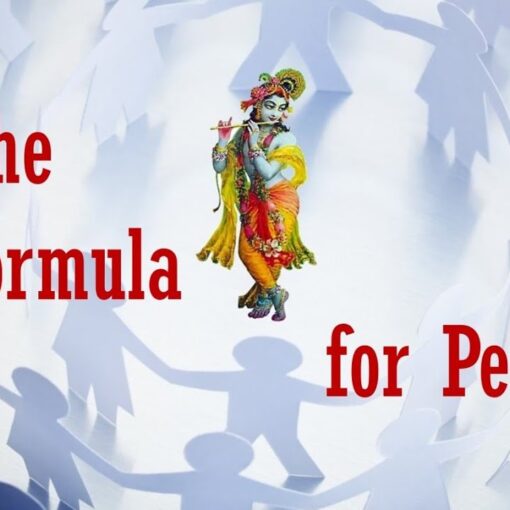Wisdom from the Bhagavad-gita to Heal and Strengthen the Heart”
Introduction
In life, we all experience moments of pain, betrayal, disappointment, and hurt. It’s natural to feel overwhelmed when people or situations don’t meet our expectations, leaving us emotionally bruised. While modern psychology offers solutions to manage pain, ancient spiritual wisdom from the Bhagavad-gita, spoken by Lord Krishna, provides timeless guidance on how to transcend feelings of hurt and cultivate a deep inner strength that makes us resilient to life’s ups and downs.
The Bhagavad-gita doesn’t just address temporary relief from emotional pain; it provides tools for lasting transformation. This blog will explore Krishna’s teachings, focusing on how to rise above hurt and embrace peace, with practical insights for daily life.
Understanding the Nature of Hurt
Why do we feel hurt? Hurt often arises because of:
- Attachment to people, situations, or outcomes.
- Expectations that are not met.
- Identification with the temporary self—the body and mind—rather than the eternal soul.
When someone’s words or actions offend us, or when life doesn’t unfold according to our desires, it wounds our ego or emotions. However, the Bhagavad-gita teaches us to redefine our perspective by focusing on the eternal reality of who we truly are.
The Wisdom of Bhagavad-gita: Overcoming Hurt
Sloka: Bhagavad-gita 2.11
“śrī-bhagavān uvāca
aśocyān anvaśocas tvaṁ
prajñā-vādāṁś ca bhāṣase
gatāsūn agatāsūṁś ca
nānuśocanti paṇḍitāḥ”
Translation:
“The Supreme Personality of Godhead said: While speaking learned words, you are mourning for what is not worthy of grief. Those who are wise lament neither for the living nor the dead.”
This verse marks the beginning of Lord Krishna’s teachings to Arjuna, who was overwhelmed with sorrow on the battlefield of Kurukshetra. Arjuna was paralyzed by grief and confusion, attached to his family members whom he had to fight against. In response, Krishna gently chides him, explaining that the wise do not lament for temporary situations because they understand the eternal nature of the soul.
Key Insights from the Verse
- The Soul is Eternal
The root cause of hurt lies in identifying ourselves with the body and mind. However, the real self—the soul—is eternal, indestructible, and untouched by material circumstances. Krishna explains this in Bhagavad-gita 2.20 :“For the soul there is neither birth nor death at any time. He has not come into being, does not come into being, and will not come into being. He is unborn, eternal, ever-existing, and primeval. He is not slain when the body is slain.”
When we realize that we are not the body but the soul, we begin to see life from a higher perspective. The insults, rejections, or failures that once hurt us lose their power because they affect only the external self, not the eternal soul.
- Temporary Nature of the Material World
Everything in the material world is temporary—relationships, situations, successes, and failures. Krishna reminds us in Bhagavad-gita 2.14 :“O son of Kuntī, the nonpermanent appearance of happiness and distress, and their disappearance in due course, are like the appearance and disappearance of winter and summer seasons. They arise from sense perception, O scion of Bharata, and one must learn to tolerate them without being disturbed.”
Just as seasons come and go, painful experiences are also fleeting. By tolerating them with patience and wisdom, we remain steady and unaffected, like a lotus that stays afloat on water without being submerged.
- Attachment and Expectations Cause Pain
The Bhagavad-gita teaches us to act without attachment to the results of our actions. Krishna says in Bhagavad-gita 2.47 :“You have a right to perform your prescribed duties, but you are not entitled to the fruits of action. Never consider yourself the cause of the results of your activities, nor be attached to inaction.”
Often, we feel hurt because we expect appreciation, love, or specific outcomes from others. By letting go of such attachments and offering all our actions and their results to Krishna, we free ourselves from emotional suffering.
Practical Steps to Overcome Hurt
How can we apply Krishna’s teachings in our daily lives to rise above hurt? Here are some practical tools:
- Chant Krishna’s Holy Names
The easiest and most powerful way to overcome emotional pain is to chant the Hare Krishna mantra :“Hare Krishna, Hare Krishna, Krishna Krishna, Hare Hare,
Hare Rama, Hare Rama, Rama Rama, Hare Hare.”By chanting, we connect with Krishna, the source of all peace and happiness. This cleanses our heart and mind of negative emotions, replacing hurt with spiritual joy.
- Shift Your Perspective
Remind yourself that you are not the body or mind—you are the eternal soul. The soul is never hurt, insulted, or diminished. When someone offends you, see it as an opportunity to strengthen your tolerance and detachment. - Offer Situations to Krishna
Whatever happens—good or bad—offer it to Krishna with love. When we surrender the results of our actions to Krishna, we no longer feel the burden of emotional pain. Trust that Krishna has a higher plan and is guiding you toward growth. - Practice Detachment
Train yourself to expect nothing from others and focus on your own service to Krishna. As Krishna says in Bhagavad-gita 2.55 :“One who is not disturbed in spite of the threefold miseries, who is not elated when there is happiness, and who is free from attachment, fear, and anger is called a sage of steady mind.”
By practicing detachment, we protect ourselves from unnecessary suffering caused by unfulfilled expectations.
- Associate with Devotees
Surround yourself with people who inspire you to grow spiritually. The association of devotees helps us see life through Krishna’s teachings and strengthens our resolve to remain steady in challenging times. - Study the Bhagavad-gita Regularly
The Bhagavad-gita is a manual for life. By studying it daily, we gain spiritual strength and clarity to face life’s challenges without succumbing to emotional pain.
Rising Above Hurt: A Real-life Transformation
Let’s consider the example of Arjuna himself. At the beginning of the Bhagavad-gita, he was overcome with sorrow and confusion. However, by hearing Krishna’s instructions and surrendering to Him, Arjuna rose above his emotional turmoil and became empowered to fulfill his duty as a warrior.
Similarly, when we internalize Krishna’s teachings, we transform our pain into strength and our sorrow into spiritual growth.
Conclusion: Healing Through Krishna Consciousness
The Bhagavad-gita teaches us that the key to avoiding hurt lies in realizing our eternal identity as the soul, cultivating detachment, and surrendering to Krishna. When we align ourselves with Krishna’s will and take shelter of His holy name, we experience a profound peace that transcends worldly emotions.
Life’s challenges are inevitable, but by following Krishna’s instructions, we can remain steady, joyful, and resilient—no matter what comes our way.
Hare Krishna! 🌸
Call to Action
Begin your journey to spiritual resilience today:
- Chant the Hare Krishna mantra daily.
- Set aside time to study one verse of the Bhagavad-gita each day.
- Reflect on how Krishna’s teachings can transform your perspective.
Stay tuned for the next blog in our “Spiritual Resilience” series, where we will explore more wisdom from the Bhagavad-gita to navigate life’s challenges with grace and strength. Hare Krishna! 🌿✨




